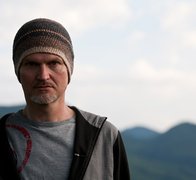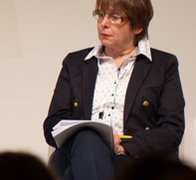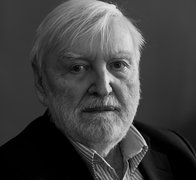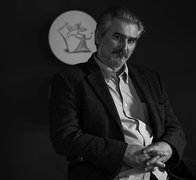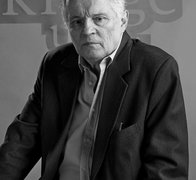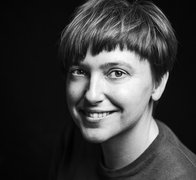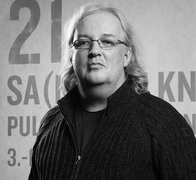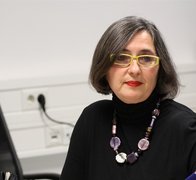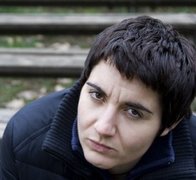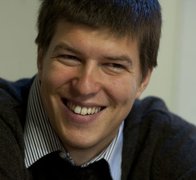A B C Č Ć D E F G H I J K L M P R S Š T V Z Ž
A
B

Vladislav Bajac
Vladislav Bajac was born in 1954 in Belgrade, where he studied at the Faculty of Humanities and Social Sciences. A founder and CEO of the publishing company Geopoetika from Belgrade, which this year celebrates its 25th birthday. A writer and English translator, occupied primarily with beat generation poets and Cohen, his earned his first acknowledgment as an author of verses. His extensive oeuvre nevertheless includes prominent novels (Život u osam imena, Hronika sumnje). A writer who connected his own texts with different aspects of cultural effort, a translated and much beloved guest, he does not shy away from doubt: “Doubt in anything that exists is a reflection of a critical mind. As well as courage, craziness and risk. Doubt unmasks things, it seeks an honesty which is also dangerous. It is good for the brave.”

Lukas Bärfuss
Lukas Bärfuss (Thun, 1971) is today the most prolific writer and playwright in Switzerland. For his stage and prose works he garnered many awards. The Theater heute magazine named him ‘the playwright of the year’. His first book of prose Die Toten Männer (short story, Suhrkamp), was published in 2002. His first novel, One Hundred Days, deals with genocide in Rwanda and the role of charity workers in this country. In these 100 days in 1994, between 800 thousand and a million people died before the eyes of humanitarian activists, UN soldiers and global media cameras. The protagonist David was a witness and part of this humanitarian disaster. In his latest book Koala, Bärfuss focuses on his brother’s suicide (the image of koala represents Australian colonial history). No matter which exotic place the plot is set in and whatever may be the narrative focus, he always describes the social image of Switzerland. In a review of One Hundred Days, the German newspaper FAZ says: ‘Lukas Bärfuss has written a Swiss novel. In Rwanda.’ He lives and works in Zurich.
C
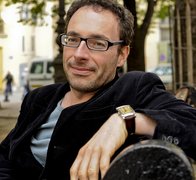
Sylvain Coissard
After 15 years working in different publishing companies as a director of international rights, in January 2007 he created Sylvain Coissard Agency. Over the years, he have been working directly with a number of great French-speaking authors of comics and children's books, such as Emile Bravo, Lewis Trondheim, Nicolas de Crécy, Mathieu Sapin, etc. He also works as a curator for Bastia comics and illustration festival (France), who has been organizing for 15 years exhibitions dedicated to the greatest international authors. He is the co-author of The True History of Art.
Č

Nadežda Čačinovič
Nadežda Čačinović was born in 1947 in Budapest, Hungary. She studied philosophy, literature, art history and linguistics in Ljubljana, Bonn and Frankfurt, and obtained a PhD in philosophy in Zagreb, where she teaches at the university. She focuses on aesthetics, gender philosophy, philosophy of language and philosophy of culture, on which she teaches at the Centre of Women’s Studies, which she also co-founded. A cultural promoter and social activist.
Ć
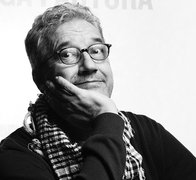
Alem Ćurin
Alem Ćurin was born in 1953 in Split, Croatia. A Hvar islander from Bačvice. He quit studying graphic design at the Academy of Fine Arts in Zagreb to dedicate his time to comic books. A graphic designer, illustrator, painter, sculptor, prose writer and essayist, whose unconventional biography says that he is “first of all a comic book artist getting ready to make the comic of his life.” An acclaimed illustrator, a master of unconventional black and white prints, sometimes “on the verge of unpublishability” because of surrealist experiments and breathtaking oniric scenes. His illustrations gave a special touch to the idea of Feral Tribune, and today he draws for the Novosti weekly.
(Photo © Tanja Draškić Savić)
D
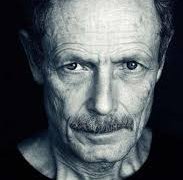
Erri De Luca
Erri de Luca is an Italian writer and translator, born 1950 in Naples. At the age of 18 he went to Rome and joined the extra-parliamentary movement ‘Lotta Continua’, and in the mid-1970s he became one of their leading voices. At that time he performed a number of jobs: a Fiat employee, a warehouseman, a bricklayer etc. His debut novel Non ora, non qui (Not Here, Not Now), about his childhood in Naples, was published in 1989. Today he is one of the most widely read Italian authors. Among the many languages he mastered is ancient Hebrew, which made it possible for him to translate biblical texts into Italian. His book The Day Before Happiness earned him his first international acclaim. A winner of many national and international literary awards, such as Petrarca, Prix France Culture etc. In 2015 he was legally prosecuted for his comment in an interview with Huffington Post (2013), when he said that the planned construction of a high-speed railway line in Val di Susa, Italy (TAV) should be ‘sabotaged’, out of environmental and other reasons. In his interview with Le Monde (2014) Erri de Luca commented that ‘it is a writer’s duty to give things their real names back’. Writers from all over the world supported his testimony in court and responded to the trial with petitions. In his defence he wrote a polemic essay under the title My Word Against. On 17 October he was cleared of all charges by the court in Turin.
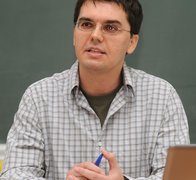
Igor Duda
Igor Duda was born in 1977 in Pula, Croatia, where he teaches history at the University. He holds a degree in history and literature and a PhD in history from Zagreb. Igor focuses on social history and history of daily life, leisure and tourism, as well as history of consumer culture and childhood (U potrazi za blagostanjem; Pronađeno blagostanje). A former member of the editorial board of Istarska enciklopedija. A winner of Kiklop.
E
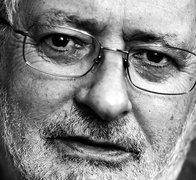
Terry Eagleton
Terry Eagleton (Salford, 1943) is a British literature and culture theorist and professor of English literature. As a child he attended a catholic school in Manchester and later he became a student of the Marxist literary theorist Raymond Williams, whose studies he continued, focusing on Marxist literary theories for a long time. In the 1960s he joined the leftist catholic group Slant and published a book on the movement. His most famous book is Literary Theory: an Introduction. Eagleton also stems both from social history Marxism and ontological catholic philosophy. Widely known for his book On Evil, in which he discusses several theories of evil, starting with St. Augustin’s ideas, all the way to Freud. Eagleton’s books always champion the pivotal human issues like the meaning of life, or what is culture, issues that philosophers also often fail to answer, but rather simply ‘analyse’. Luckily, Eagleton is not a philosopher (so he says) – he is rather trying to interpret how theorists of all eras, from Shakespeare to Schopenhauer, thought about it and that is how he arrives to surprising, entertaining and intelligent discoveries. In 2015 two of his books were published in Croatian: Culture and the Death of God (Ljevak) and The Idea of Culture (Jesenski & Turk).
F

Zoran Ferić
Zoran Ferić was born 1961 in Zagreb. He is among the most prominent Croatian writers of his generation, admired and well read, recipient of all the important professional and state awards. He teaches Croatian language in a high school in Zagreb. His first book, stories Mišolovka za Walta Disneyja, was published in 1996. Four years later his second book was out, Anđeo u ofsajdu. Novels Smrt djevojčice sa žigicama, Djeca Patrasa and Kalendar Maja, were published in a succession in 2002, 2005 and 2011 respectively. Kalendar Maja launched him to the very pinnacle of national literature. His works have been translated into several languages. Toying with the hypochondria complex, a penchant for grotesque and bizarre, paradoxical gentility of his expression are what makes Ferić original and special. His views on illness, old age and rejecting the usual norms – which he expresses also in his newspaper texts – made an impact on both social and literary trends in the country.
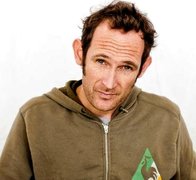
Benjamin Flao
Benjamin Flao is a French comic book artist, born 1975 in Nantes. His father, painter Gildas Flahaut, says that he was ‘a man with a pen’ from very early on. At the age of 14 he enrolled in the famous comic book artists school Saint-Luc in Belgium, but continued further education in Nantes. Since 1994 he has been a street caricaturist and in 2002 he published his first graphic novel, which earned him a Prix Lonelyplanet. Since then he has drawn and written several graphic novels and comic book collections and took part in different collective graphic novels. The book Kiliana Song, translated into Croatian, speaks about a boy named Naim on Lamu Island. Flao today resides in Brittany.
G

Vesna Goldsworthy
Vesna Goldsworthy (Belgrade, 1961) is a writer, scholar and poet, professor of English literature and creative writing at Kingston College in Surrey. She writes in English and has published several books, including the most famous ones Inventing Ruritania: The Imperialism of the Imagination (Yale, 1998 / Belgrade, Geopoetika, 2005) and Chernobyl Strawberries (Atlantic, 2005 / Belgrade, Geopoetika, 2006). In her first book, enthusiastically acclaimed by both the audience and the British critics, she explores the image of Balkan in literature and cinema. The second book of memoirs became an instant bestseller: a personal family testimony about growing up in Belgrade and moving to England. The Observer calls it ‘funny, painful and brilliant’, The Guardian ‘outstanding’. For her poetry collection The Angel of Salonika (Salt, 2011 / Belgrade, Arhipelag, 2012) she was awarded the Crashaw Prize for best book of poetry that year.

Boris Greiner
Boris Greiner was born 1959 in Zagreb. As an author he is active since 1983. Together with Stanislav Habjan he curated a series of projects in different media (graphic materials, prose, performances, exhibitions, actions and experimental films) as part of his 20-years-long conceptual project Greiner & Kropilak Mailart Office. Since 1992, together with S. Habjan and Danijel Žeželj, he has been active in the art group Slipa Konfidenca and in 2001 the three of them were joined by Boris Cvjetanović in the art workshop Petikat. So far he has published seven prose books, curated 20 solo exhibitions and performances, and made 10 films. He works as graphic design professional.
H
I
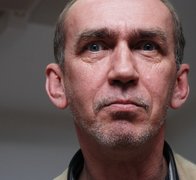
Oleksandr Irvanec
Oleksandr Irvanets was born 1964 in Lviv. Graduated from the Teacher Training Polytechnic in Dubno and Maxim Gorky Institute of Literature in Moscow. He first worked as a teacher and journalist and currently he teaches at the Ostroh Academy National University. He translates into Ukrainian from Polish, Russian, Belarus and French. Together with Yurii Andrukhovych and Victor Neborak, in 1985 he founded the Bu-Ba-Bu group which spoke about Ukrainian reality through humorous literary performances. He wrote 25 books of poetry, prose and drama, translated into many world languages. His novel Rivne/Rovno was shortlisted for Angelus Award in Poland in 2007, and Liebenkraft’s Diease in 2014. In Croatia his collection of plays The Five Pieces was published in 2010, and this year Edicije Božičević issued Liebenkraft’s Disease in Croatian. This dark and thrilling novel is a sort of pamphlet against the state, skilfully using grotesque that slowly pervades subtle descriptions of the protagonist’s inner world. He lives in Rivne and Irpin near Kiev.
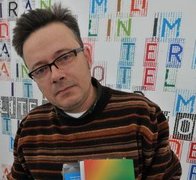
Ivica Ivanišević
Ivica Ivanišević, born 1964 in Split. Journalist since the Croatian independence. Author of brilliant headings for other people’s texts. Anonymous people’s artist in the sphere of journalism and one of the most talented aphorists in a culture that despises aphorisms. That is why he himself never writes them but turns them into news headings, subtitles and intertitles. A brilliant chronicler and historian of popular comics, he began writing prose quite late. His first prose book Ulaz za djecu i vojnike is dedicated to Split and one strange childhood. His first novel followed, U sedlu je tijesno za dvoje, in which he focused on childlike reflexes of the first people who landed on the Moon. With Renato Baretić he compiled a bogus lexicon Split za početnike, and he also wrote a magnificent biography of Miljenko Smoje, filled with light-hearted respect for the famous master. On commission he writes film and TV scripts and (mono)dramas. Patiently he endures the city he was born and is trying to live in.
J
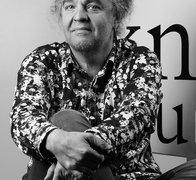
Miljenko Jergović
Miljenko Jergović is the most widely read and most translated author and poet in this part of the world. Born 1966 in Sarajevo, he has been living in Zagreb since 1993. Author of more than 30 published books: novels, short stories, collections of poetry and essays. In his columns he comments on political, cultural and social events and issues in the region and beyond. As an impassioned reader he ceaselessly presents, discusses and discovers literature and art from different countries and cultures and writes about them. In his essays he focuses on social conditions in former Yugoslavia, referring often on unaddressed or overlooked historical contexts, criticises neo-nationalist and neo-fascist tendencies in current political matters. In his prose he describes how political circumstances and changes in former Yugoslavia changed the destinies and lives of their protagonists. He received a large number of local and international literary awards, and in 2015 he garnered the Njegoš Prize, one of the principal literary merits in the region, since Miljenko Jergović, as the jury explanation says, ‘is present on these territories, important for our cultures and spirituality, for the crucial issues of cultural and national and linguistic identities, for the notion of nation, for the notion of other and for our alter ego, for south Slavic dramatic conflicts, destinies and tragedies’.
K
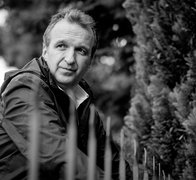
Namik Kabil
Namik Kabil is a Sarajevo-based writer, screenwriter and film director, born 1968 in Tuzla, but originally from Trebinje, where he spent his childhood. War took him to Los Angeles, where earned a living as a taxi driver while studying film at Santa Monica College and Los Angeles City College. After nine years in America, he returned to Bosnia. He has written several scripts for TV, but he is by far best known for his script for the feature narrative Kod amidže Idriza, directed by Pjer Žalica. His documentary film Interrogation won the Heart of Sarajevo for best documentary film in 2007, followed by other international merits. In 2004 he published his first book Sam (Zoro, Sarajevo). Recently he published Amarcord (Hena.com, Zagreb, 2015), a book about experiences in life, refuge and America.

Božo Koprivica
Božo Koprivica was born 1950 in Nikšić. He studied world literature at the Belgrade Faculty of Philology, back in the university golden days. Most of his professional time he spends as a dramaturge in Belgrade’s theatres and writing some very exciting hybrid prose of his own, which in principle begins and ends as an essay, but in between a reader is trapped in the midst of a great autobiography, biography, travelogue, chronicle and adventure novel. His mastery is incomparable and valuable among our language group. He is also the author of perhaps the finest literary portraits of Kovač, Kiš, Mihailo Lalić in these senile and illiterate times, and a brilliant football writer. If Shakespeare makes theatre worthwhile, then Božo Koprivica makes football worthwhile. Those who do not know and refuse to know this game are losing one amazing literature.

Željko Krušelj
Željko Krušelj, born 1958 in Kuzminec, is a journalist and writer. Majored in history and comparative literature from the Zagreb Faculty of Humanities and Social Sciences. His career began in Zagreb’s Polet as a writer and editor, and later he wrote for Arena and Danas weekly. In 1991 he started writing the comment section in Vjesnik, and afterwards for a short time in Slobodna Dalmacija. For ten years he has a column in Večernji list. He has published a dozen books, mostly on Croatian 20th century history. Today he writes for the pressedan website and occasionally for Jutarnji list and Večernji list.
L
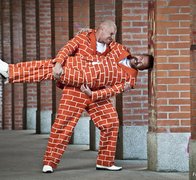
BELI SLADOLED Leon Zudar i Miha Perne
A painting duo, brush brothers, graduated on the same day in 2004. Their works took them on a journey across Europe and beyond, and in 2011 they won the OHO award. This small label from Slovenia also specialises in publishing drawings and graphic fanzines, art books, and similar publications, under the name of BS books & zines. Their issues are a place for experimental and humorous drawings for art gourmets and other drawing fanatics.
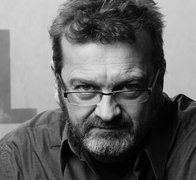
Kruno Lokotar
Kruno Lokotar was born in 1967 in Daruvar, Croatia. He graduated in comparative literature, history and library sciences in Zagreb, where he lives and works. A writer, editor and cultural promoter. He launched series of platforms for a better visibility of literature: festivals, awards, TV reading podcasts. During his editorial practice in publishing, he particularly focused on prose: “Stories bring order to messy lives and experiences, they convey experience. The fact that we are so focused on it speaks about how inherent it is to man.” A winner of Kiklop.
(Photo © Tanja Draškić Savić)
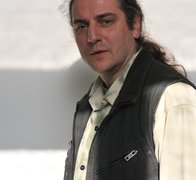
Predrag Lucić
Predrag Lucić, born 1964 in Split, where he still lives, is one of the founders and makers of Feral Tribune. He launched and edited Feral’s edition that published a series of important works of local, regional and European literary production – one of the finest literary editions in the history of independent Croatia. Since summer 2009 he has been writing the column Trafika for Rijeka’s Novi list. Author of Greatest Shits - Antologija suvremene hrvatske gluposti (co-author Boris Dežulović, 1998), book of songsHaiku haiku jebem ti maiku (2003), book of lyrical poetryLjubavnici iz Verone (2007) andMjesec iznad Splita (2012), and out of his socially engagedmock poems, persiflages and burlesque poems he compiledthe booksSun Tzu na prozorčiću (2009) andBezgaća povijesne zbiljnosti I and II (2010) andGusle u magli (2013). Since 2007,together with Dežulović, he has been performing at a poetry cabaretMelodije Bljeska i Oluje.
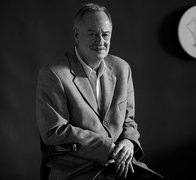
Dragutin Luce Lučić
Dragutin Lučić was born in 1948 in Rijeka, Croatia. He went to school in Pula and graduated in Zagreb, with an MA in political sciences under professor Vanja Sutlić. A former editor at Channel 3 of the Croatian Radio in Zagreb, university teacher of journalism, co-editor of the philosophy edition Meta. Author of several essays on philosophers and performed and published plays (the book Operacija Joseph Gross). He focuses on Tin Ujević as a reader of Nietzsche: on the issues on “the collision of conscience, the Apollonian and the Dionysian, tragedy and comedy, eternal return, justice, suffering and joy – and above all solitude!”
(Photo © Tanja Draškić Savić)
M

Zvonko Maković
Zvonko Maković was born in Osijek, Croatia, in 1947. He graduated in history and art history, and obtained a PhD in art history in Zagreb. A university professor of modern art, art historian, poet and essayist. A founder and curator of many solo and retrospective exhibitions and the national commissioner for the Venice Biennale in 2001. “In poems it all seems different. / When I read the phrases others write, / it all seems clear and easy.” he says in his poem Poslije. He has published several books of essays, columns and supplements, as well as a dozen art books dedicated to contemporary artists.
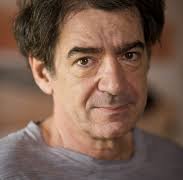
Miki Manojlović
Miki Manojlović, born 1950 in Belgrade, is one of the most famous actors in the region, with over 70 film and TV roles under his belt. Widespread popularity came with one of his first roles, Miki Rubiroza in Karanović and Grlić’s iconic serial Grlom u jagode. In Kusturica’s When Father Was Away on Business he starred in the archetypal role of a tragic Yugoslav revolutionary and pater familias, which can today be interpreted as a metaphor of decay of a country and its value system. This year he staged Romeo and Juliet with Serbian and Albanian actors in their native languages. Also this year he has an automonograph coming out, A ko si ti, published next to Dobrica’s Ring, the most prestigious acting award which he won in 2012.

Goran Marković
Goran Marković was born 1946 in Belgrade and studied film directing at FAMU in Prague. Between 1977, when he made his feature debut Specijalno vaspitanje, and 1989 and Sabirni centar, his last pre-war film, he had already achieved an impressive body of seven films, all of them extremely leaning on the Yugoslavian social reality. Variola vera (1982), whose storyline is directly inspired by the epidemics of smallpox which caught Yugoslavia ten years before, is a possible allegory on the country in decay, an ominous prophecy about what would happen ten years later. Between 1992 and his autobiographic tragic comedy Tito i ja, and Falsifikator in 2012, he made several fiction and documentary films and several TV series episodes, but his was neither cinema of continuity or coherent signature works, nor Goran Marković made the effort of coping in the so-called transition and wild corporate capitalism. Instead he started writing books in which he partially writes about history of film and theatre, and the role of his family in this history. Also he touches on what he has always been doing: beautiful and artistically impressive storytelling. As a writer Goran Marković is as convincing and authentic as he was as a film director. A rare case of superior command of both words and images.
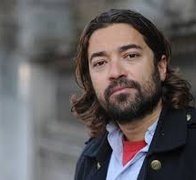
Dragan Markovina
Dragan Markovina was born in Mostar and all the things he managed to do in his 34 years are almost incredible. He was 11 when the war in his city started, 12 when HVO armed soldiers broke into his home, which he would not leave all until, years after the war, he was evicted by international regulations. After that Dragan lived as a refugee in his father’s old homeland, a small auxiliary paradise known as the island of Korčula. In the early 2000s he studied history in Zagreb, earning an MA and PhD at the Faculty of Humanities and Social Sciences in Split. There they kicked him out – formally speaking, his job contract was not renewed – due to political unsuitability and anti-fascism. Existential matters and academic curiosity propelled him to move to Zagreb. He has published three books, two of which stirred the readership. The first, Između crvenog i crnog, focuses on the (lack of) culture of memory on the examples of Mostar and Zagreb, and the second one, Povijest poraženih, in a way chronicles the historiography of new Croatian outsiders. He is one of the first four winners of the Mirko Kovač Award.
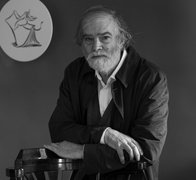
Tonko Maroević
Tonko Maroević was born in Split in 1941. An art historian and writer. In Zagreb he earned a PhD with a thesis on fine art in Croatian literature since the modern period. An academician in the literary department of the Croatian Academy of Sciences and Arts. His research focuses on contemporary Croatian art, he publishes reviews and discussions in periodicals, forewords in catalogues and print portfolios and monographs (Nives Kavurić-Kurtović, Zlatko Kauzlarić Atač, Vojin Bakić). He translates from several languages (G. Cavalcanti, Dante, F. Petrarca, G. Papini, F. García Lorca, J. L. Borges, R. Queneau). As a literary expert he systematically follows contemporary Croatian poetry and also focuses on older Croatian literature and Italian language.
(Photo © Tanja Draškić Savić)
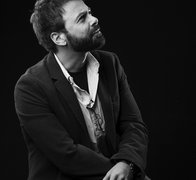
Andrea Matošević
Andrea Matošević was born in 1979 in Pula. He graduated in ethnic anthropology and Italian literature and completed a graduate course in intercultural studies in Padua, and a PhD in ethnology and cultural anthropology in Zagreb. He works at the Faculty of Interdisciplinary, Italian and Cultural Studies and the Centre of Cultural and Historical Research of Socialism, Juraj Dobrila University in Pula. His research focus is ethnic anthropology (Socijalizam s udarničkim licem), history of anthropology/ethnology, oral histories, industrial anthropology, popular culture, theories of multiculturalism and philosophy. In his research he devotes special attention to the multiple theoretical potentials of boredom.
(Photo © Tanja Draškić Savić)

Đorđe Miketić
Đorđe Miketić was born 1978 in Belgrade and grew up in Gornji Milanovac, in a country too broad and a town too narrow for him. However, with all the issues of Dečije novine fresh off the press and playing in a punk band, he slowly began opening the door to the world… HE graduated from high school in Charleston, South Carolina, majored in dental medicine in Belgrade and specialised in the same field at the University Clinic in Bonn. His love of literature and writing developed hand in hand. He finished courses in literature and communication at the Faculty of Media and communication in Belgrade, followed by an MA in drama from the Academy of Dramatic Art in Sarajevo. He has been publishing texts and poetry in newspapers and student magazines, acted as editor-in-chief of an academic journal, written a blog, stories, poetry. Two of his plays have been staged and a film will be shot next year in Korčula based on his script. Paradajz is his first novel which he dared to send to a publisher.
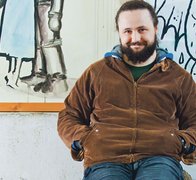
Miron Milić
Graduated from the High School of Applied Arts and Design in Zagreb and in 1999 took up the university course at the Academy of Fine Art, Department of Graphic Arts. He graduated in 2006 under professor Miroslav Šutej. Since 2002 he has been actively pursuing drawing and exhibiting his works in Croatia and internationally. He works as an illustrator and freelance artists in his studio at AKC Medika, and recently he has made a name for himself as a street art muralist. As a visiting artist, he took part at several international festivals and residencies in Ljubljana, Belgrade, Heilbronn and Zagreb.
P

Jurica Pavičić
Jurica Pavičić was born 1965 in Split, where he lives and works as a film critic and columnist in Jutarnji list. He is the author of probably the oldest column in a Croatian newspaper, Vijesti iz Liliputa, which he began writing back in 1994 in Vijenac. A renowned film critic, whose views are respected even by those whom he harshly criticised. He emerged on the literary scene in 1997 with a social thriller Ovce od gipsa, focusing on war crime in Split in 1992, which he later turned into a script for Vinko Brešan’s feature narrative Witnesses. Both the film and the script won Golden Arenas and in the post-war period the book and the film had a cathartic effect on the traumatised society. In 2000 the Croatian National Theatre in Split staged Pavičić’s play Trovačica, which earned him a Marin Držić Award. The same year he published the novel Nedjeljni prijatelj, followed by Minuta 88 (2002), Kuća njene majke (2005) and Crvenkapica (2006). Later on he published two books in his favourite genre – short stories Patrola na cesti and Brod u dvorištu. This year Profil publishing company issued his crime novel Žena s drugog kata.
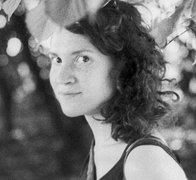
Ivana Pipal
Ivana Pipal graduated in animation and new media from the Zagreb Academy of Fine Art. She pursues visual art in different media, illustration, animation and comic book, art book, installation and video. 2x2 publishing company issued her first book Priča o teti Mandi, earning her the University of Zagreb Rector Award, and City of Zagreb acknowledgment for best literary work in 2013.
R
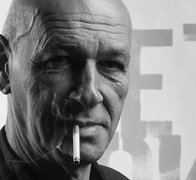
Borivoj Radaković
Borivoj Radaković was born in 1951 in Zemun, Serbia. He graduated in literature in Zagreb, where he lives and works. One of the founders of the Festival of Alternative Literature. A prose and stage writer, author of the novels Sjaj epohe and Virusi, stories Ne, to nisam ja, essays and travelogues Sredina naprijed and drama Plavi grad. His drama trilogy about Zagreb was staged at the Kerempuh theatre. He translated W. S. Burroughs, J. Kerouac, J. Barnes and H. Kureishi. The novel Što će biti s nama, writes Jutarnji list, impresses with “linguistic knowledge and skill,” “a use of living language and slang, archaisms and English words, neologisms and dialect words, linguistic differentiations of sociological groups and, of course, verses, resulting in the main storyline taking place in language itself.”
(Photo © Tanja Draškić Savić)
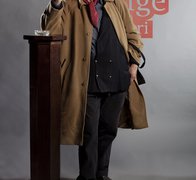
Milan Rakovac
Milan Rakovac was born in 1939 in Rakovci, Croatia. Educated in Pula, Zagreb and Split, a former member of the navy, a former editor of Glas Istre, he gradually devoted himself fully to literature. His Izabrana djela in four volumes summarise Istria from the inside, through language, text, tradition and memory: book one features verses, book two the famous novel Riva i druži, book three continues with another novel (La Triestina), book four returns to biographism via island and mountain lucidariuses. As Aljoša Pužar said, Rakovac “matured ideologically on the crossroads of inherited Istrian folk and communist antifascism, of liberal democratic values and multiculturalism, with anarchist twists and a critique of the neoliberal paradigm, remaining a true advocate of intercultural dialogue.”
(Photo © Tanja Draškić Savić)
S

Joachim Sartorius
Joachim Sartorius is a German writer, poet, translator and publicist. Born 1946 in Fürth as a son of diplomats. Schooled in Tunisia, Congo and Cameroon, graduated in Bordeaux, France. Later he studied law in Munich, London, Strasbourg and Paris. Between 1974 and 1986 he held a diplomatic post (New York, Istanbul and Cyprus), for several years he managed DAAD’s cultural programme (German academic department for artists and scholars exchange), served as secretary general at the German Goethe Institute and managing director of Berliner Festspiele. Writes prose and poetry and translates from French and English. In 2014 he published a large anthology of political poetry, Niemals eine Atempause. The Princes’ Islands are a kind of autobiographical travelogue with a literary and poetic view on the Turkish islands from the title. Memory, travel and meditation, these are the cornerstones of Sartorius’s prose and poetry. Winner of the Rockefeller Foundation and the Colloquium fellowships. His translations of American poetry earned him the Paul Scheerbart Prize. In 2011 he became Chevalier des Arts et des Lettres and a member of the German Akademie für Sprache und Dichtung. Sartorius lives and works in Berlin.
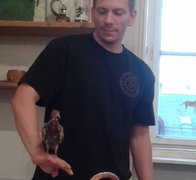
Boris Stanić
Painter and comic book author, graduated from the Belgrade Faculty of Fine Arts, Department of Painting. He took part and exhibited his works at many workshops and group exhibitions locally and internationally. Author of the graphic novel Radosav: Jutarnja magla, the comic book collection Blatište, graphic novel Atentat – s one strane patnje and one of the authors of the graphic novel Miroslavljevo jevanđenje: apokrifna verzija. He is currently working on part two of his Radosav trilogy.
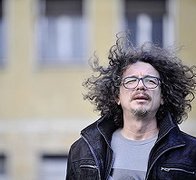
Slavoljub Stanković
Slavoljub Stanković was born in 1968. He majored in philosophy from the Belgrade Faculty of Humanities and Social Sciences, and specialised in Advertising at the Belgrade University of Arts. He works at one of the largest advertising agencies in Belgrade and is the author of hundreds of campaigns for renowned local and international brands.
Until last year he published two novels, The Box and Split. Although, he said in an interview, as a marketing expert he would never advise himself as a writer to publish three books in just nine months, last year he did the exact thing. And it was not a mistake. Knjiga utisaka, co-authored with Slavimir Stojanović and published by Kreativni centar, was a huge success among the readers. The novel in verse for children and adults, Čarobnjak Dandruf, by the same publisher, was described as reminding the readers of good old literary values. Prvaci sveta!, published by Geopoetika, an omnibus novel set in Zagreb, Ljubljana, Belgrade and Sarajevo during the basketball finals when Yugoslavia won, caused a great interest in the entire region.

Jón Kalman Stefánsson
Jon Kalman Stefansson is an Icelandic writer, living in Mosfellsbær, Iceland. Born 1963 in Reykjavik. He worked as a fisherman and at fishing industry factories, as a bricklayer and airport police officer. Only later he took up literature and after graduation began working as a teacher. He wrote for the Morgunblaðið newspaper and the Ríkisútvarpið radio station. He published 12 novels and three poetry collections. Heaven and Hell is his first novel translated into Croatia (Fraktura). Known for his stories written from a child’s point of view whose simplicity produces a special authenticity and intensity. His prose despite (or precisely because of) linguistic simplicityradiates a profound mystery of ancient Icelandic legends and the presence of archaic nature to which one is exposed in those areas. Nature, mountains, sea and weather are rarely so present in prose as they are in Jon Kalman Stefansson’s novel.
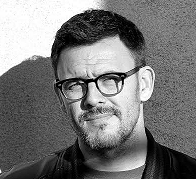
Slavimir Stojanović
Slavimir Stojanović, a Belgrade-based designer, born in 1969, has won over 200 international awards, including Epica, Cresta, Eurobest, Clio, Cannes Advertising Festival, Golden Drum, ADC Award, TDC Award, Grifon, Brumen and many others. His projects are part of collections at the Museum of Art and Industry in Hamburg, Museum of Posters in Warsaw, and Centre Pompidou in Paris. His works have been presented in countless magazines and books like Graphic, Communication Arts, Print, How, Creative Review, Computer Arts etc. In 2003 he founded his own creative agency Futro in Ljubljana, and in 2007 he moved his business to Belgrade. From the very beginning, in the mid-1980s, his work was strongly influenced by historical avant-garde, primarily Zenitism. In September this year the Belgrade Museum of Applied Arts organised him a large exhibition, Complicate Simply, characterised as a ‘retrospective at the age of 46’. A great interest in this retrospective turned it into a travelling exhibition, accompanied by a lavish monograph
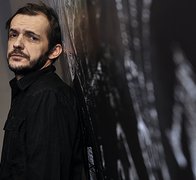
Aleksandar Stojković
A singer, poet and writer, was born in Bor, Serbia in 1973. Front man and lyrics writer for the alternative rock band Goribor, mostly to a wide critical and public acclaim. Goribor performed at countless festivals in the region and its work has been compared to Joy Division and Ekaterina Velika. His last album Evo je banja was released in 2012 by Dancing Bear, followed by extremely positive reviews and a new regional tour. A talented, original and creative poet, Stojković has so far published three poetry collections, and his honest and emotionally charged poetry is often inspired by life in a mining town in southeast Serbia. The most important Croatian rock critic Aleksandar Dragaš recently wrote: ‘Every culture should be happy to embrace Stojković as a great poet whose exorcismof the demons of soul, everyday numbness and ugliness of the world is underlined by a hypnotic magma of blues, psychedelia, post-punk and trip-hop, Cooder, The Velvet Underground, The Doors, The Gun Club, Suicide and Joy Division.’
Š
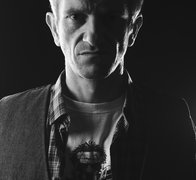
Vladimir Šagadin
Vladimir Šagadin was born in 1975 in Banja Luka, Bosnia and Herzegovina. He lives and works in Zagreb. A graphic designer, illustrator and comic book publisher. He works as an editor, screenwriter and radio, TV and website host (Radio 101, Laku noć, Hrvatska, NewsBar, Šlep Šou and Kvizna situacija). He publishes texts and essays about the comic book. A curator of comic book events at literary festivals and the owner of a creative trade 2x2, publishing prominent comic book authors’ titles in the namesake edition.
(Photo © Tanja Draškić Savić)
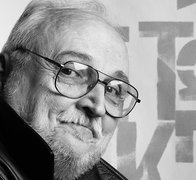
Slobodan Šijan
Slobodan Šijan, born 1946 in Belgrade, is a painter, film director, screenwriter and film critic. Until 1980 he was involved in visual art and experimental film. In the early 1980s he began actively pursuing film directing, and to the opinion of professionals and audience his achievements in former Yugoslavia remain unsurpassed. The film Who’s That Singing Over There, a true masterpiece, is most often mentioned as the best Yugoslavian film of all times. The film The Marathon Family is the most quoted work of art both in the field of popular culture and of colloquial discourse of an entire language. On the literary scene he appears in 1998 with a poetry/prose work Vrtoglavica and in 2012 in Zagreb he published the book Kino Tom, part his intermedia project dedicated to Tomislav Gotovac. The book garnered Jutarnji list’s award for best non-fiction published in Croatia that year. This year he published Filmus, focusing on the Black Wave period. To that aim, this October he got a cover of the Nin weekly.
T

Dana Todorović
Dana Todorović is half Serbian and half American, of Finnish and German origin, who lived in seven different cities, studied acting and drama because she wanted to be an actress like the rest of her family, and she also starred in several supporting roles. With her husband she runs a bistro/restaurant in Vračar, colourfully named Dokolica (Leisure), where she design recipes as well: one soup on the menu is called Dana’s Thai Soup. She has two cats, Peni and Maco. For a long time she worked for the UN as an interpreter. Not talented in math, but skilled in drawing and music, she hopes she will find a time to dedicate to composing original film scores.
Her first novel Tragična sudbina Morica Tota marked her appearance in the iconic Stubovi kulture in 2008, and this year Geopoetika published her second novel, Park Logovskoj. Vladislav Bajac in his editor’s note says that the novel ‘leans on the finest legacy of classic and modern Russian and Anglo-Saxon tradition, but also Far East thought. Acts as an impenetrable shield against one’s own demons.’
V
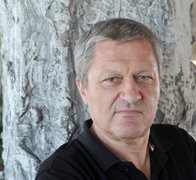
Dragan Velikić
Dragan Velikić, a citizen of Pula, born 1953 in Belgrade by mistake. He grew up in Pula and then returned to Belgrade for his university studies. There he became a storyteller, essayist and novelist, one of the most prominent in the local languages. Pula is his principal literary obsession. He writes about it in different poetic discourses, in different times and time flows, trying to make up in literature for what life took away from him. A reader thus easily gets the impression that Velikić mainly lives in his novels. His novels are his residence and abode, it is where police can look for him in case of unpaid television bills. His novels have been translated across Europe, but first came to fame in Germany. Sometimes Dragan Velikić seems to appear like a German writer in local literatures. But Pula is largely responsible for this illusion, as it is significantly a Habsburg and Austrian city.
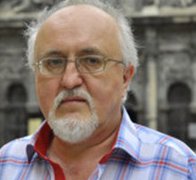
Jurij Viničuk
Yuriy Vynnychuk (1952) is a famous Ukrainian writer, talented philologist, editor, translator and journalist. Born in Stanislaviv (today Ivano-Frankivsk) in western Ukraine, he studied philology at Vasyl Stefanyk Precarpathian National University. In 1974 he decided to move to Lviv. There he became a director at the Lviv Theatre of variety ‘Ne žurys!’ (Do not worry!), wrote scripts and composed original scores for stage plays. Between 1991 and 1999 he worked as an editor in magazines and newspapers. Yuriy Vynnychuk’s most famous works include: The Flash, A Place for the Dragon, Welcome to Rattown, The Nightmaids, Malva Landa, Tango of Death, The Mysteries of Lviv Coffee. Two animated films were made based on his fairy tales. His works have been translated into many languages. The first novel we are able to read in Croatian, thanks to Lilija Šutjak’s translation is Tango of Death. The protagonist is the city of Lviv, once and now. It opens to a reader as in an antique tableau or photograph, through vibrant descriptions of Lviv’s day and night life, Lviv in rain and sun, during weekdays or holidays.
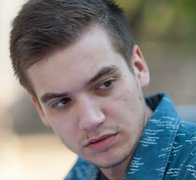
Borna Vujčić
Borna Vujčić was born 1993 in Zagreb, where he attended elementary school and Tituš Brezovački High School. The same year he took up dramaturgy at the Academy of Dramatic Art in Zagreb. His first play, Pa može se i tako reći, was staged at Academy of Dramatic Art’s Theatre Festival and adapted for Croatian Radio’s drama section in the show Kratke forme. His play Pečat was performed by the Ulysses Theatre on Veliki Brijun in 2015.
The same year he publishes Nužno zlo, a young adult fiction novel set in an imaginary high school in Zagreb where school life turns into a political allegory – classes are states and individuals are leaders on whose decisions the lives of ordinary students depend. There are also representatives of the media who shape the public opinion, secret services in charge of dirty work, xenophobes and pacifists, liberals and conservatives, and the issue of war takes an important place in the thrilling plot.
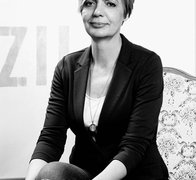
Marina Vujčić
Marina Vujčić was born in Trogir, Croatia, in 1966. She graduated in literature in Zagreb, where she lives and works as an editor with Hena com. She stepped onto the literary scene with texts for children and popular music (the environmental fairy tale in verse Bijeg uz brijeg, the script for the animated film Kućica u krošnji, the song Još te nima performed by Tedi Spalato). She edited the monograph Odiseja – 15 godina Kazališta Ulysses, wrote six novels (Tuđi život, Susjed, Pitanje anatomije), and a book of plays (Umri ženski).
(Photo © Tanja Draškić Savić)
Z

Zdravko Zima
Zdravko Zima was born 1948 in Malinska, island of Krk. As a writer he spent his formative years in Vjesnik’s publications, acted as an editor at Danas magazine, welcomed the millennium at Novi list newspapers, from where he was forcefully retired and ousted from Croatian public and publishing life. A long-time chronicler of what not, a zealous literary critic, an enraptured writer about literature in all its aspects and incarnations. After the lustration, he began writing a journal almost by force, which was this year published in Zagreb in early autumn, under the self-cynical title Dnevnik jednog skribomana. This book will one day be an important document of the state of Croatian social idiocy in the second decade of the 21st century. Zima is good at style, a diligent reader, a man who even today manages to enjoy the company of other people in simulations of cultural life in Croatia.
Ž
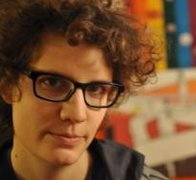
Jasna Jasna Žmak
Jasna Jasna Žmak, originally from Pula, based in Zagreb, dramaturge and playwright. In theatre she collaborated with Borut Šeparović (Timbuktu, 55+) and Oliver Frljić (Buđenje proljeća, Leksikon Yu mitologije). As a playwright she published Samica and Istovremeno drugi, directed and choreographed by Matija Ferlin. As a screenwriter she worked with directors Igor Bezinović, Radislav Jovanov Gonzo, Ivana Škrabalo and Ivan Faktor. One of the founders of a website dedicated to Croatian drama Drame.hr and the Dramaturge Collective. In 2012 she became an assistant teacher at the Academy of Dramatic Art, Department of Dramaturgy. In addition to scripts and plays, she also publishes short stories and critical reviews.
